| Srl | Item |
| 1 |
ID:
104171
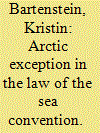

|
|
|
|
|
| Publication |
2011.
|
| Summary/Abstract |
This article examines the so-called "Arctic exception," Article 234 of the 1982 UN Convention on the Law of the Sea. Article 234 is intended to give the coastal state of ice-covered sea areas the necessary powers to prevent, reduce, and control vessel source pollution, which poses a particular risk to the highly sensitive Arctic marine environment. The aim of this article is to present a thorough interpretation of Article 234 in order to eventually evaluate the provision's significance for Arctic navigation, specifically in the Canadian Arctic and the Northwest Passage.
|
|
|
|
|
|
|
|
|
|
|
|
|
|
|
|
| 2 |
ID:
165684


|
|
|
|
|
| Summary/Abstract |
As climate change continues to melt Arctic sea-ice, the Northwest Passage will likely see more international cargo shipments in the future. Since China is the world’s largest trading and shipping state, a significant portion of that traffic can be expected to involve Chinese companies. For this reason, it is widely assumed that China will eventually side with the United States in its longstanding dispute with Canada about the legal status of the Northwest Passage and assert that the waterway constitutes an “international strait”. This assumption may prove to be incorrect as China has practical and legally strategic reasons to side with Canada, especially because of similarities between the Northwest Passage and the Qiongzhou Strait. This article thus suggests it may be mutually beneficial for both Canada and China to recognize each other’s “internal waters” positions in these two waterways.
|
|
|
|
|
|
|
|
|
|
|
|
|
|
|
|
| 3 |
ID:
172433
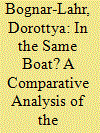

|
|
|
|
|
| Summary/Abstract |
In the field of Arctic shipping, Canada and the Russian Federation have enacted extensive unilateral national regulations cognizant of Article 234, UN Convention on the Law of the Sea. On the global level, both states have been important actors in negotiating the International Maritime Organization’s mandatory Polar Code, a legal instrument with implications for regulations at the national level. This article compares and contrasts the approaches, positions, and arguments of Canada and Russia especially regarding national systems to control navigation and vessel-source pollution. The results suggest different emphases stemming from the two states’ political and economic realities and capacities.
|
|
|
|
|
|
|
|
|
|
|
|
|
|
|
|
| 4 |
ID:
119864
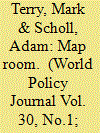

|
|
|
|
|
| Publication |
2013.
|
| Summary/Abstract |
Prince of Wales Strait, Northwest Territories-A century ago, traversing the Northwest Passage was a grueling effort that often took years. Explorers frequently perished as their boats sunk or got trapped in the abundant pack ice. Today, these waters are mostly ice-free during the summer, and ships can sail through with ease.
|
|
|
|
|
|
|
|
|
|
|
|
|
|
|
|
| 5 |
ID:
121480
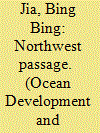

|
|
|
|
|
| Publication |
2013.
|
| Summary/Abstract |
This article uses the Northwest Passage as a case for study of one issue relating to the regime of international straits: whether a strait formed geographically and functionally by means of artificial aids for navigation may be regarded as an artificial waterway to which the regime of international straits does not apply. The article suggests that the Northwest Passage could be subject to a bilateral treaty regime between Canada and the United States, largely akin to that which applies to artificial waterways such as the Panama Canal. This solution would guarantee both Canadian sovereignty over the Passage and the interests of international shipping in having a route open and secure.
|
|
|
|
|
|
|
|
|
|
|
|
|
|
|
|
| 6 |
ID:
118011
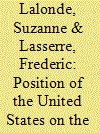

|
|
|
|
|
| Publication |
2013.
|
| Summary/Abstract |
For decades, Ottawa and Washington have been agreeing to disagree on the question of the legal status of the Northwest Passage. One argument which has been consistently raised on the U.S. side and which has precluded attempts to end the deadlock has been the fear of creating a negative precedent. This article assesses whether U.S. concerns are warranted: could coastal States elsewhere in the world rely on an eventual recognition of Canadian sovereignty over the Northwest Passage to bolster their claims over a local strait?
|
|
|
|
|
|
|
|
|
|
|
|
|
|
|
|
| 7 |
ID:
167221


|
|
|
|
|
| Summary/Abstract |
Dating to the early Cold War, Canada and the US have disagreed on the status of the Northwest Passage. For Canada, the waters of the Arctic Archipelago are internal, historic waters. For the US, the sea route is an international strait. Despite this fundamental disagreement, cooperation between the two states in the Arctic has long been effective and friendly. In part, this can be attributed to decades of careful diplomacy, which has strategically set aside the intractable legal questions in favour of a comfortable “agree-to-disagree” arrangement. In the age of MAGA diplomacy under President Donald Trump, this successful system appears at risk. With discussion of Arctic freedom of navigation voyages for the US Navy becoming commonplace, and the old diplomatic safeguards breaking down in favour a new zero-sum foreign policy approach, Canada may soon face a new challenge to its Arctic sovereignty.
|
|
|
|
|
|
|
|
|
|
|
|
|
|
|
|
| 8 |
ID:
128285


|
|
|
|
|
| Publication |
2014.
|
| Summary/Abstract |
Heightened attention is being paid to the Northwest Passage, the waters that flow among the islands of northern Canada and that, in the next decades, may be amenable to commercial navigation. Most debates regarding the Passage's legal status focus on Canada's contention that it is its internal waters and the United States' contention that it is an international strait. This article proposes that a designation of the Passage as Canada's territorial sea would be as legally robust as the internal waters or international strait designations while satisfying both Canada's and the United States' political objectives.
|
|
|
|
|
|
|
|
|
|
|
|
|
|
|
|